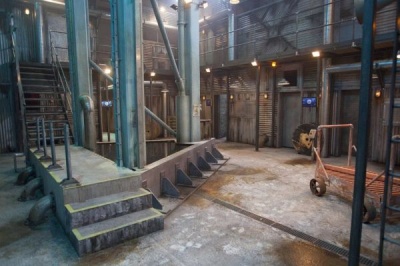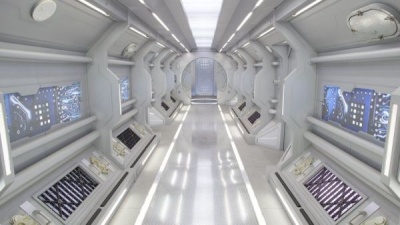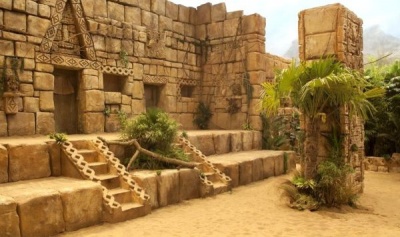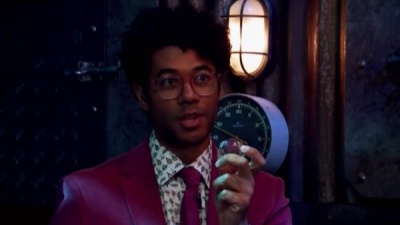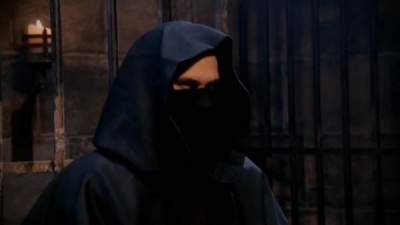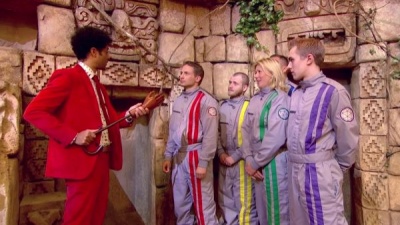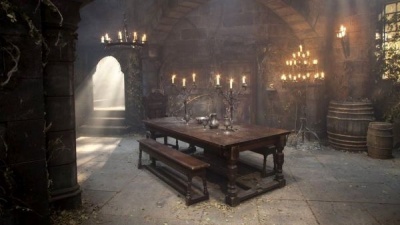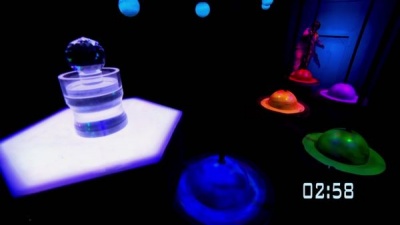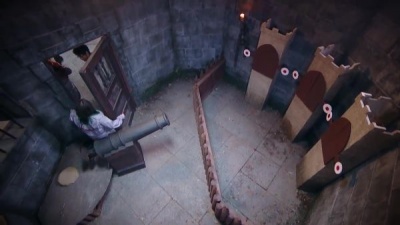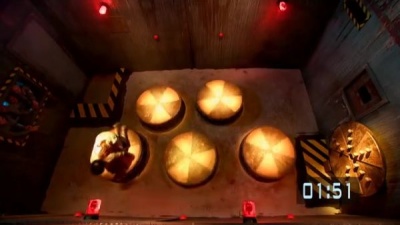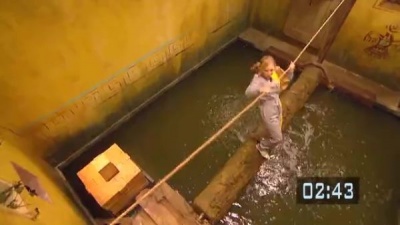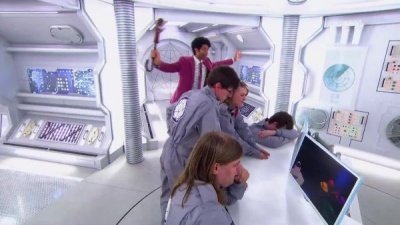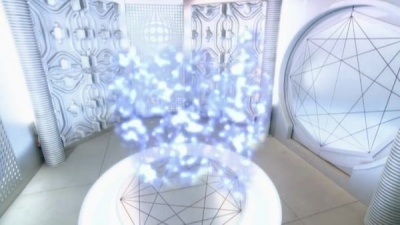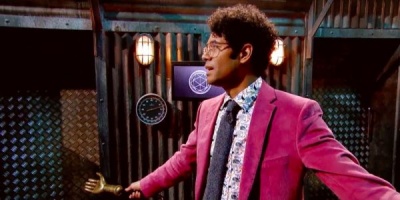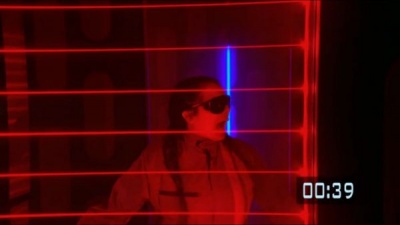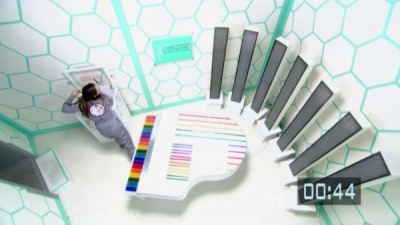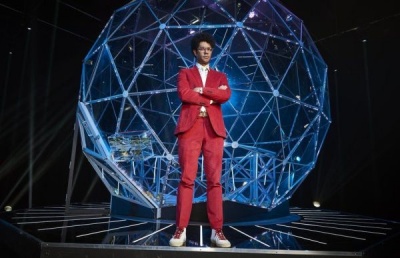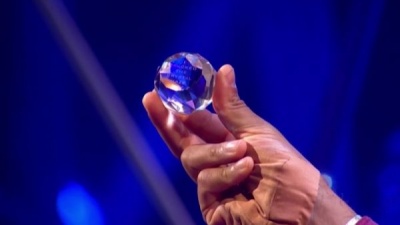Weaver's Week 2017-10-22
Last week | Weaver's Week Index | Next week
Andrew Lloyd Webber has retired from the House of Lords. The erstwhile lawmaker once wrote a hit West End musical. You don't catch Richard O'Brien putting up with this.
Contents |
The Crystal Maze
Fizz / RDF West for Channel 4, 25 August – 13 October
We're also going to touch on the celebrity editions, which aired 23 June – 13 July.
Shall we start with something we can praise, and that (we think) everyone loves? The set design. James Dillon does it again. By re-using the familiar Aztec, Industrial, and Mediaeval layouts, The Crystal Maze instantly feels familiar. It helps that the first thing we saw was the outside of the Industrial zone, which hasn't changed a jot in 27 years.
But the Futuristic zone has been re-imagined. In 1990, an abandoned space station. In 2017, a real-life space station, bright and clean and glowing. Yes, they've replicated some ideas from London's Crystal Maze Live attraction, and we're entirely happy. This fits our contemporary vision of the future, just as the world of slightly misbehaving computers fit the 1990 vision of the future.
The visual details are to just as high a standard. Each zone gives instructions through small plaques, in a standard typeface for each zone. (In a nod to the show's heritage, the Industrial zone re-uses the Bank Gothic typeface from the 1990 series.) Aztec uses a consistent set of symbols, Mediaeval still couches its games in Roman numerals, and Future World now has lasers and hand scanners. It's a superb visual design, comparable to the world built by Bromans.
We're less enamoured of the sound design. The producers have decided to put some backing music behind all the games, and we're not convinced this is a good thing. There's enough tension from the team outside shouting "Ten seconds! Get out!" without the tune swelling towards a climax. Show us the tension, don't tell us what to think by musical cues.
We've certainly lost the ambient noises – the distant throbbing in Industrial, wind and dripping in Mediaeval, birdcalls in Aztec. This column would like to see some episodes without the music, to see if it really does improve the programme.
A more certain reaction comes from the sound effects. We've no problem with effects that might reasonably be part of the game, such as a buzzing when a contestant makes an error. We're just about OK with effects noises, like the whirr when something is plugged in and something else springs into life – the chipset game in Futuristic gains from its little effect.
But we can live without the soft brush when something happens. A floating thingummy is retrieved in Aztec? Well done, it doesn't need the soundtrack to point up our excitement, let the player and team do that naturally. Too often, television soundtracks tell us what to think, and we'd rather draw our own conclusions.
The Snowman Cometh
There's a new host, Richard Ayoade. He's an acquired taste, being the embodiment of an unreliable narrator.
Ayoade stands apart from the team. He doesn't join in their group hugs and high fives, and certainly doesn't replicate Ed Tudor Pole's Cosmic Handshake. Ayoade doesn't always join in the group's more physical efforts, he'll slope off rather than climb a wall or go through a tunnel; you wouldn't catch Richard O'Brien missing a transition. Ayoade is so distant that he will lead a contestant via a special wooden stick in the shape of a hand, and he will not touch anyone.
With his gaudy corduroy suits, Ayoade looks the part, too. He's almost smart, but actually looks just as scruffy as if he'd worn a ripped t-shirt and cut-off jeans.
So, from his physical manners, we would expect him to play a brusque and unsympathetic character, an outsider who doesn't fit in. Were Ayoade a reliable narrator, he would take glee in locking people in, he would be howling with rage as soon as someone dared win a crystal. But Ayoade is not that character: the horror is played by The Jailer, a silent character in Mediaeval.
Ayoade will feel for the team, but will not deign to feel with the team. When a team is doing well, he'll praise them. He will give credit where it is due, applaud successful performances, hold out the prospect of much more. When a team is doing badly but trying hard, he will only gently mock.
But when a team is doing badly and doesn't seem to be putting much in, Ayoade turns on the flamethrowers. Gentle hints ("Does the boat unhook? These are not rhetorical questions!") turn into unsubtle persuasion ("This is a timed event!", the new "There's never plenty of time!"). He will give advice, then turn to the camera and ask out loud, "Why do they ignore me? I give advice, they ignore it."
Ayoade's character speaks in cliche. We could almost replace him with an animatronic robot. "The next game is physical. Who's playing? Follow the hand. Tuck in, tuck in. This is a two minute game, and it's an ALIS: automatic lock-in situation. You have three lives, it'll become apparent when you go in. You will look slightly different in the next shot, that's editing. Tonight, Matthew, I'm going to be..."
The most submerged catchphrase is a tribute to John Ebdon's occasional programme on Radio 4, where he'd rummage through the station's archives for ordinary material, and link it in imaginative ways. Ebdon's sign-off? "If you have been, thank you for listening."
Could we have had a woman host The Crystal Maze? We reckon so. To pick three names, Cariad Lloyd is versatile and swift-witted, and builds characters up from nothing (we still rate Stacey-May Anaïs from DNN). Caitlin Moran need only play herself. Jessica Hynes – appearing here as The Knight – subverts all our expectations. (It's a surprise that The Knight has been absent from the civilian series, only turning up for two of the celebrity editions.)
Ayoade will also brook none of this male chauvinism nonsense. Back in the summer's celebrity episodes, one of the women contestants got herself locked in. One of the men on that team said they wanted to buy her out because “she’s a lot prettier”. Instantly, Ayoade jumped in “Stop being creepy”. That's the sign of a man.
Put the watchermacallit in the thingamabob and crank the jiminy
Early publicity for this series promised 41 games, all of them entirely new. This has not come to pass.
For starters, there's not one but two takes on the classic Mumsey riddle-mistress. The Jailer in Mediaeval, who will ask mathematics puzzles. And there's Jarhead (played by Adam Buxton) in the Future, who will ask some wordplay riddles. In both cases, two out of three to win the crystal. {1}
Some of the best games are very simple ones. For instance, a player gets across a room decorated as planets, moving from pole to pole. It's a concept so simple a child of three could understand what had to be done. On one episode, this game went viral; the player wasn't very good at it. {2}
Other games take simple structures and turn them into art. A water tank plus some wooden dividers and a few symbol blocks results in a very simple memory game. Put four blocks into the right place, twice. Very few teams have understood this idea, and it's made compelling viewing.
But many games have not worked on television. "Put the lights out", a memory game from the Richard O'Brien era, has come back to haunt us – at least it's been proven winnable this time. Another Industrial game, lining up parts of a chute, is just the wrong side of frustrating.
"Radioactive Rock", in the Future zone, was beset by technical problems and short-circuits, and also deathly boring to see. That was another repeat from previous years. "Menotte" (the pipe maze) is a direct lift from Fort Boyard.
Some games are just too large for the space. In Mediaeval, the "Cannonball Anagram" crams a cannon worked by elastic into one corner of the room, firing pellets at the opposite corner. This would be fine, except that the player has to fit into a teeny-tiny space behind the cannon. Not all players can fit in this space and generate enough power to fire the cannon.
Other games have suffered from poor execution – both the "Toy Chain" Mediaeval game and "Word Shapes" in Industrial could be completed with arrangements different from those shown on screen. Some episodes have suffered from poor planning. In one episode, the team played two games in Mediaeval, and both turned out to be maths games.
All things considered, we reckon the games themselves are about average – a few flashes of brilliance, more clunkers than ideal, a lot that are unexceptional filler. They're not quite as good as the games from later series in the 1990s. All games speak with a similar voice, we are not surprised that they've all come from one hand. {3}
If this column could play one game in each zone, we'd go with:
- Aztec – Sliding Bridges, where the planks slide to form a path in and out.
- Industrial – Wheels of Fivetune, push a button from each rotating disc without falling off.
- Mediaeval – Apple Tree, balance a dozen apples on a tree.
- Futuristic – The Colour Piano, remember a tune (sequence of colours) while completing a jigsaw
At the end comes the Crystal Dome, still catch the gold tokens and avoid the silver ones. Judging from the scores, we think there might be more gold than silver – it was the other way round in the 1990s. Prizes remain cheap. A five-person ticket for the Yorvik Viking Centre, with guidebook, is about £130. Tandem skydiving for five, a "top prize", might be £1000. Still, that's almost six years' top prize on Jeopardy! {4}.
All the viewers want to watch me! Duckula TV! It's all about me!
Back in 2015, the BBC has a revolutionary idea for its Wimbledon coverage. Rather than show an hour of highlights, they'll do something different. They'll concentrate on the players, they'll cover Andy Murray's "journey", Ana Ivanovic's "progression", and Maria Sharapova's "enhanced performance".
There was only one problem: no-one wanted Wimbledon 2day. The fans who had been watching all day would rather see the concluding match on court 14. The fans who had been at work all day wanted a quick recap of the day's main events. No-one wanted to see a bunch of ex-players sitting around and talking about tennis, we wanted to see some actual tennis.
Live television has one great advantage: they can take a broken format and turn it on its head. Wimbledon 2day introduced more highlights and less banter as the matches progressed. By the second week, all that remained was the show name and the rooftop studio.
The Crystal Maze doesn't have this luxury; all 20 episodes were made before we saw any of them. Compared to the 1990s series, there are a number of changes.
We're here as a team Players now apply as a cohesive unit, not as individuals. This helps because players can be given games they're likely to be good at (winning makes good television), or will fail in an entertaining way (that also makes good telly). The downside – a very insular group – ought to be weeded out in auditions. Don't think this change has hurt the show.
All 5 It Austerity has reached The Crystal Maze, and team sizes have reduced from 6 to 5 players. One fewer name for us to remember, one less character to appreciate, it's a little easier to follow. Again, we're neutral – this hasn't hurt the show, nor has it directly improved it.
Strictly two-step There are now precisely ten games in every episode. So far, every single player has taken part in two challenges: one in the first two zones, one in the back half. We know who will be playing games 5 and 10, if not what they'll be playing. Excitement comes down, we know in advance that Boring Steve will play next, and he's done nothing all hour. This change has hurt the show.
Phil Tyme With fewer games, the producers have decided to "concentrate on the players", because that always makes for the best television. There are extended conversations outside the main maze, discussions inside, and a distinct lack of pace. Back in the day, Richard O'Brien would call, "It's your time!" when the team were dawdling. Now, Richard Ayoade has "This is a timed event" to chide the team for wasting time. He has no catchphrase to chide the producers for wasting the viewers' time.
The Crystal Maze needs pace, it needs momentum, it needs to fire on all cylinders. The show needs to be an experimental rocket, while we hope it fires the payload due up, we will appreciate the drama of the rocket firing in all directions.
This series has been less of a rocket and more of a puttering golf buggy. It's often six minutes from the continuity announcement to the start of the first game. O'Brien might be asking who will play game two before Ayoade starts game one. While the 2017 show is shorter than the 1990 equivalent, that only accounts for one lost game: the remainder is a production decision.
When it comes to the crunch, we say the stars of The Crystal Maze are the games. They have character, they will grow in reputation (the Industrial pipe is tough but fair), we will come to love and hate them over the series. The contestants are the supporting cast, an interchangeable set of bit-part actors. Here today and gone tomorrow.
The producers take a different view. The story they want to tell is about relationships within a group, it's about the captain shouting "You are a disappointment!", it's about whether the vice-captain will buy out the man who stole her captaincy. To this end, they've made it easier for games to have a conclusion: victory, or failing that an Automatic Lock-In Situation. These changes help, but leave us wanting more.
This column's experience of The Crystal Maze Live could have been improved with some proper jeopardy; every second was filled with something. The Crystal Maze 2017 has the jeopardy, but the producers chose not to live every every second.
Crystals Are Forever
All of the episodes have been previewed on the internet two days early. This led to some very undesirable outcomes.
Spoilers! No. This column doesn't want spoilers. We want to know nothing about the show before we see it. Even the title sequence – which changes each week – gives something away, as it shows players moving between zones. So we've had to mute organisational octothorpes and not read boards.
Lack of live experience Friday night is not Crystal Maze night. Thursday at 8 would be ideal, something light to steer us towards the weekend. Friday night opposite Mastermind and Only Connect and clashing with the last minutes of Top of the Pops was most inconvenient. We ended up taping the show at 7.57, and watching it just after 9. We couldn't join in live conversations, and had to ignore the official accounts until after the show. Community is undermined, we can't be part of the social buzz.
Let us viewers tell our stories Another sign of the times: Channel 4 has made it difficult to share clips of their new show. On one level, this is reasonable – while the show is available on Channel 4's website, that's the place to watch it. To our regret, Channel 4 does not permit clips to be used by other video reviewers. Fair dealing is an exception under copyright law, allowing brief extracts for review, commentary or criticism. Channel 4 – or its "technology partners" – will claim copyright has been breached as soon as they find a clip, whatever the context, and remove the reaction. This is a failure in technology, and we don't think it comes from malice. It's really discourteous.
Conclusions
We came into The Crystal Maze with very high expectations. Let's be fair, the revival has almost met our hopes – and there's still more to come. Richard Ayoade has defined his own character, something Ed Tudor-Pole never quite managed. The stars of the show are a work in progress, we expect next year's games will be better. The pacing is badly wrong, and this vexes us, because it's so simple to fix. The move to teams who know each other has gone better than we feared. And the prizes are still rubbish.
Best show of the year? No. Best Channel 4 show of the year? To our surprise, no; we enjoyed Streetmate more, because Scarlett doesn't waste a second.
Worth another series? Very much so.
Crumbs, there's fanfic
Rule 34 applies, but is strictly confined to the Industrial Zone.
What happened when the Danger Mouse crew played The Crystal Maze? Penfold couldn't complete the three-piece jigsaw to play the piano, Jeopardy was excellent at following Schwarznut's instructions when blindfolded. Danger Mouse won all his games but very nearly got locked in because he left everything to the last second. And Danger Moth was blown away by the Dome.
At some point, someone suggested that Richard O'Brien was to Russell T Davies as Ed Tudor-Pole was to Steven Moffatt. Well, yes, if you squint at it. Richard O'Brien had a madcap demeanour, slightly detached from the real world. We can hear him use the words of RTD's greatest creation: "Three. What an odd number." {5}
Ed Tudor-Pole was a little harder, an inquisitive guide after the truth. If he'd put on a fake accent, he would be Spike Thomson from Press Gang.
But this analysis falls down, because Richard Ayoade is the reincarnation of Press Gang editor Lynda Day. He's not unsympathetic, and he can be generous to those who earn his approval. But whenever he's disappointed, whenever there's a chance to snark at a poor team rather than laugh with them, he takes it.
We're waiting for all the players to get locked in, so Richard can end the show with a soliloquy.
"There's a tribe living by a river, and in the river there are crystals. The tribe has one particular piece of wisdom passed down through the generations. It goes like this: if you happen to meet a crystal, don't stick yourself in its cell.
"Every now and then – and who knows the reason – people ignore this advice. Which is sad. Because they get locked in. But very stupid because they were warned. They had a choice.
"The moral of this story is – you can't afford to be stupid. There are crystals."
This Week and Next
We've gone on for so long about The Crystal Maze that we don't have time to recap MIPCOM's many new shows. We'll fit that in next week.
Sean Hughes, the stand-up comedian, has died. He was 51. It was back in 1990 when he won the Edinburgh Festival award for the funniest show, A One Night Stand broke ground by having a story rather than just sketches. His television work included Sean's Show (Channel 4, 1992-4).
The game show connection is the early (and best) version of Never Mind the Buzzcocks, alongside Mark Lamarr and Phill Jupitus. Hughes wasn't comfortable with this level of fame, and withdrew from the comedy limelight early this century. A book, It's What He Would Have Wanted (2000) and regular appearance on BBC 6 Music were more representative of his tastes.
On University Challenge, Corpus Christi Cambridge (Tristan Roberts, Kripa Panchagnula, Joseph Krol, Benedict McDougall) beat St Anne's Oxford (Ramani Chandramohan, Cameron Royle, Kanta Dihal, Andrew Jamieson) by 225-135.
Shahab Mossavat won Mastermind, he took Muhammed Ali and accumulated 26 across the two rounds. Alison Zrada's runner-up score of 23 (specialist: His Dark Materials) does not trouble the repêchage board. Steve Lacey (Tony Hancock) and Claudia Webb (Eva Perón) also took part.
The Great Jam Factory of Baker Street was a clue on Only Connect, much to Professor Squawkandcluck's delight. (It's the only show that even approaches her intellect.) Vikings beat the Parishoners 23-12: the Parishoners failed to pull off a five-point connection, the Vikings spotted rebuses for English cities, and the game had turned. Vikings go through to the quarter-final, Parishoners drop to the losers' bracket.
BARB ratings in the week to 8 October.
- Strictly Come Dancing (BBC1) is still the biggest show, Saturday's performance seen by 11.15m, Sunday's results by 9.65m. Doctor Foster the biggest non-game show (BBC1, Tue, 9.8m).
- The Grate Breadxit Burn-Off stabilises (C4, Tue, 8.05m). The X Factor continues to make schedule furniture (ITV, Sun, 6.85m). Have I Got News for You trundles on (BBC1, Fri, 5.2m) and Pointless Celebrities also (BBC1, Sat, 4.35m).
- University Challenge is big on BBC2 (Mon, 2.6m), with Dragons' Den hit by Strictly (Sun, 2.4m). Dancing on Two takes 1.7m in the teatime slot, ahead of The Big Family Cooking Showdown (Thu, 1.45m).
- Just 1m for The Crystal Maze (C4, Fri), still just ahead of Celebrity Juice (ITV2, Thu, 985,000). In a thin week for digital channels, A League of Their Own (The Satellite Channel, Thu) slipped to 655,000, and Taskmaster (Dave, Wed), fell to 570,000.
- Three more new shows: Sing Ultimate A Cappella (The Satellite Channel, Fri, 450,000), Masterchef Antipodes (W, Thu, 195,000), Your Face or Mine (Comedy Central, Wed, 190,000).
Look out, Robot Wars is back (BBC2, Sun). There's also the first Junior Eurovision heats (TG4, Sun), and the final of Painting the Nation (RTE1, Sun). Shaun Williamson's back on Pointless Celebrities (BBC1, Sat), and ITV has – again – embargoed its Saturday schedule until Tuesday. So we can't talk about the return of you-know-what (ITV, Sat) or the live episodes on that other show (ITV, Sat).
Photo credits: Fizz / RDF West.
To have Weaver's Week emailed to you on publication day, receive our exclusive TV roundup of the game shows in the week ahead, and chat to other ukgameshows.com readers, sign up to our Yahoo! Group.
Last week | Weaver's Week Index | Next week
Footnotes
{1} The producers would note that Jailer will take a prisoner if it's not won, and Jarhead cannot have a lock-in. As far as we're concerned, they're the same game.Back to article
{2} And we were tickled to see pop star Katy Perry audition for this game during a concert, getting herself stuck on a planet.Back to article
{3} What an odd number. {6}
{4} The Ringer has an entertaining write-up of this week's Jeopardy!, with a top prize of One Yankee Dollar (on which tax is payable).Back to article
{5} Benjamin Rory Slade from Why Don't You.Back to article
{6} After we've seen them all, we may present a game-by-game review of this series. No promises.Back to article
{7} Thank you for reading, if indeed you still are. Farewell!


